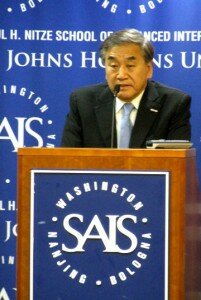Chairman Lee Addresses Corruption in the South Korean Government

Lee Jae Oh, Chairman, Anti-Corruption and Civil Rights Commission, Republic of Korea, speaking at the U.S.-Korea Institute at SAIS on May 24, 2010.
In an event on May 24, 2010, the Honorable Lee Jae Oh, Chairman of South Korea’s Anti-Corruption and Civil Rights Commission (ACRC) addressed several imminent challenges facing South Korea today, including the Cheonan incident, the Korea-U.S. Free Trade Agreement and anti-corruption activities under the Lee administration.
Chairman Lee presented official comments on the Cheonan incident. He denounced North Korea’s attack and sinking of the Cheonan as an intolerable act of aggression. He explained that the South Korean government would act in consultation with the international community and seek global cooperation to safeguard world peace and prevent future aggressions by North Korea.
Chairman Lee encouraged the U.S. Congress to promptly ratify the Korea-U.S. Free Trade Agreement (KORUS FTA), suggesting that the ratification of the KORUS FTA would further the current U.S.-Korea alliance and friendship. Though there may be disparities in the two countries’ economic interests, a prompt ratification of KORUS FTA would close that gap and promote mutual benefits.
Finally, Chairman Lee presented the anti-corruption policy under the Lee administration. South Korea has emerged as a highly industrialized and democratic country and has achieved enormous economic success, despite its lack of resources and land, and its relatively small population. However, to become an advanced nation and raise national competitiveness, the South Korean government is implementing anti-corruption policies through the ACRC to eradicate corruption, a problem which has become rooted in Korean culture. The South Korean government is implementing various anti-corruption policies such as integrity assessments on publicly funded institutions and projects. Furthermore, the ACRC seeks to create a new norm where strong integrity is the core value in all public administrations. Chairman Lee also suggested that the South Korean government is seeking to share its experiences with other countries and to learn from Western countries as well.
Download the transcript of Chairman Lee’s speech, “Anti-Corruption and Transparency: South Korea’s Pathway to Preeminence in the Asia-Pacific.” (Audio coming soon.)
BIOGRAPHY
Lee Jae Oh is a distinguished politician in South Korea and has devoted his life’s work to the democratization of Korean society. A former high school teacher, from 1971-1996 Mr. Lee was involved with organizations which opposed South Korea’s authoritarian regimes and worked to bring about democracy. In 1979, he also served as the director of Amnesty International-South Korea.
Mr. Lee’s political career began in 1996, when he was elected into the 15th National Assembly and in 1998, he became the vice floor leader of the Grand National Party (GNP). He was re-elected as a National Assemblyman again in 2000. In 2002, Mr. Lee managed Lee Myung-bak’s (now President) successful re-election campaign for Mayor of Seoul and served on the Mayor’s Seoul government transition team. He was also appointed to a GNP planning task force for the 2002 presidential elections. In 2004, Mr. Lee was re-elected into the 17th National Assembly and became a house representative for the GNP. From 2006-2007 Lee served as a supreme council member of the GNP.
Mr. Lee is a former Visiting Scholar at the U.S.-Korea Institute at SAIS and professor at Chung-Ang University in Seoul, South Korea.



